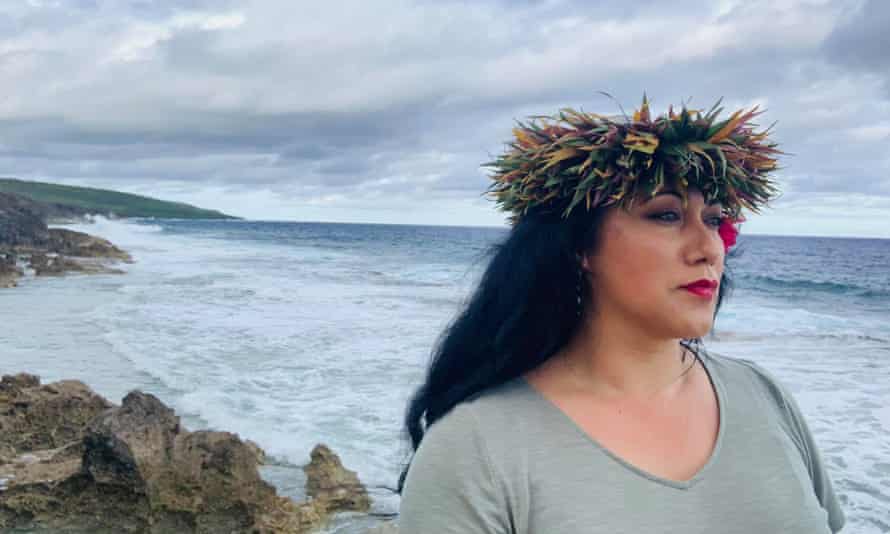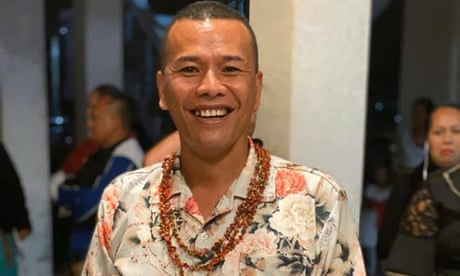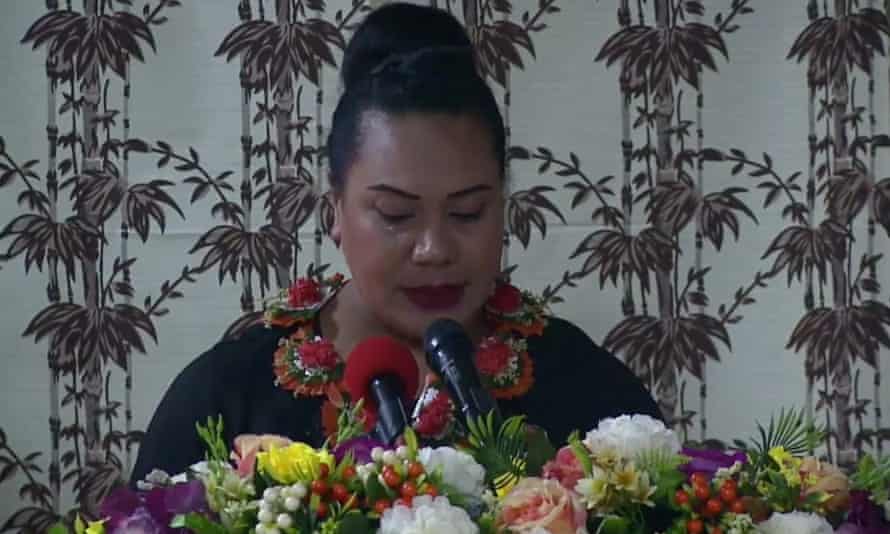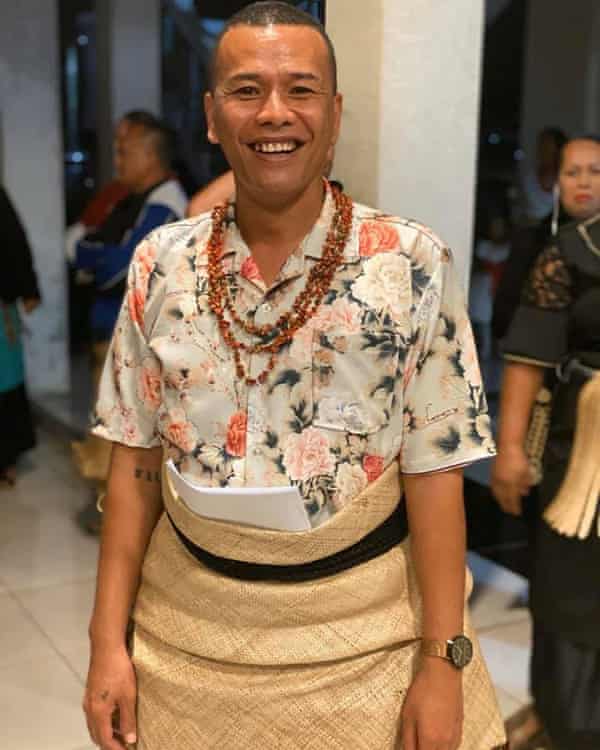After the alleged murder of Polikalepo Kefu, Pacific LGBTQI groups are calling for change, including revoking sodomy laws

Phylesha Brown-Acton, a fakafifine woman from Tonga, is calling for legislators in the Pacific nation to revoke queerphobic laws and protect LGBTIQ+ people. Photograph: Supplied
Supported by

Supported by

About this content
Leni Ma'ia'i
Sat 8 May 2021 06.28 BS
The large hall of the basilica in the Tongan capital Nuku’alofa, hasn’t seen many crowds since Covid restrictions were introduced a year ago.
But on Thursday night, people from across all parts of society packed every inch of available space in the venue, clad mostly in black and the traditional woven ta’ovala dress.
Tongan authorities have granted an exemption to the 50-person cap on indoor gatherings, so that people from across the Pacific country can come together for a candlelight vigil in memory of LGBTQ+ and humanitarian activist Polikalepo “Poli” Kefu.

Outpouring of grief after alleged murder of leading Tongan LGBTQI activist
Kefu, 41, a beloved leader in Tonga, was killed on Saturday on a beach near his home in Lapaha. Police have charged a 27-year-old man with his murder. The death has sent shock waves through the small country and through its LGBTQI+ community, who hope that it will spur action to tackle homophobic attitudes and to repeal thediscriminatory laws in the country.
Among those who have come to pay tribute is a member of the country’s royal family, Princess Frederica Tuita, who struggles through tears as she speaks about her close friend of nearly 20 years.
“Being Tongan means living as Poli did, embodying our society’s values of love, humility, respect, and loyalty,” said Tuita.
Leni Ma'ia'i
Sat 8 May 2021 06.28 BS
The large hall of the basilica in the Tongan capital Nuku’alofa, hasn’t seen many crowds since Covid restrictions were introduced a year ago.
But on Thursday night, people from across all parts of society packed every inch of available space in the venue, clad mostly in black and the traditional woven ta’ovala dress.
Tongan authorities have granted an exemption to the 50-person cap on indoor gatherings, so that people from across the Pacific country can come together for a candlelight vigil in memory of LGBTQ+ and humanitarian activist Polikalepo “Poli” Kefu.

Outpouring of grief after alleged murder of leading Tongan LGBTQI activist
Kefu, 41, a beloved leader in Tonga, was killed on Saturday on a beach near his home in Lapaha. Police have charged a 27-year-old man with his murder. The death has sent shock waves through the small country and through its LGBTQI+ community, who hope that it will spur action to tackle homophobic attitudes and to repeal thediscriminatory laws in the country.
Among those who have come to pay tribute is a member of the country’s royal family, Princess Frederica Tuita, who struggles through tears as she speaks about her close friend of nearly 20 years.
“Being Tongan means living as Poli did, embodying our society’s values of love, humility, respect, and loyalty,” said Tuita.

Princess Frederica Tuita speaks at a candlelight vigil held in Tonga for Polikalepo Kefu. Photograph: Broadcom fm Broadcasting
As diplomatically as she can, considering her high-profile position, Princess Tuita proceeds with an indictment on Tonga for allowing Kefu’s death to happen.
“Our society has yet to take command of the responsibility required to truly commit to those [Tongan] values, and implement them where it counts.”
Where it counts, Tuita implies, is in the greater protections of leitī people against the threat of hate crime.
The Tongan word leitī is one of the many descriptors across the Pacific region to recognise the diverse sexual and gender expressions in their populations.
“It’s more of a comfort word for the LGBTQ+ community. We just call everybody leitī, whether you are trans, a lesbian, or however you identify,” says Joey Joleen Mataele, founder of the Tonga Leitīs Association, who passed down her presidency to Kefu in 2018.
A man handed himself in to police on Monday and has been charged with Kefu’s murder. Tongan Police have not commented on whether they believe Kefu was the vitim of a hate crime, or not.
The hashtag #JusticeForPoli has stayed trending as communities from around the South Pacific gather to host their own vigils. Specifically, the justice the Pacific LGBTQ+ groups are calling for is sweeping law reform, including the repeal of Tonga’s Criminal Offences Act, which makes sodomy punishable by up to 10 years in prison.

As diplomatically as she can, considering her high-profile position, Princess Tuita proceeds with an indictment on Tonga for allowing Kefu’s death to happen.
“Our society has yet to take command of the responsibility required to truly commit to those [Tongan] values, and implement them where it counts.”
Where it counts, Tuita implies, is in the greater protections of leitī people against the threat of hate crime.
The Tongan word leitī is one of the many descriptors across the Pacific region to recognise the diverse sexual and gender expressions in their populations.
“It’s more of a comfort word for the LGBTQ+ community. We just call everybody leitī, whether you are trans, a lesbian, or however you identify,” says Joey Joleen Mataele, founder of the Tonga Leitīs Association, who passed down her presidency to Kefu in 2018.
A man handed himself in to police on Monday and has been charged with Kefu’s murder. Tongan Police have not commented on whether they believe Kefu was the vitim of a hate crime, or not.
The hashtag #JusticeForPoli has stayed trending as communities from around the South Pacific gather to host their own vigils. Specifically, the justice the Pacific LGBTQ+ groups are calling for is sweeping law reform, including the repeal of Tonga’s Criminal Offences Act, which makes sodomy punishable by up to 10 years in prison.

President of Tonga Leitis Association Polikalepo Kefu who was killed in Tonga. Photograph: Twitter
These legal issues are not unique to Tonga. In popular tourist destinations like Samoa and Cook Islands, homosexual sex acts are punishable by a prison sentence.
Samoa, which has hosted fa’afafine – understood in western terms as the third, non-binary gender – beauty pageants since the 1970s, only repealed laws criminalising the “impersonation” of females in 2013.
These legal issues are not unique to Tonga. In popular tourist destinations like Samoa and Cook Islands, homosexual sex acts are punishable by a prison sentence.
Samoa, which has hosted fa’afafine – understood in western terms as the third, non-binary gender – beauty pageants since the 1970s, only repealed laws criminalising the “impersonation” of females in 2013.
According to Phylesha Brown-Acton, a fakafifine (a Niuean gender identity designation) woman and executive director of F’ine Pasifika, these discriminatory laws empower some members of the community to feel comfortable acting in hateful ways toward leitī people.
“It gives people the permission to further treat leitī worse than dogs. I’m sorry to say, but in Tonga, Tonga has a Dog Act. Dogs have vets and doctors that look after them. There’s absolutely nothing for the leitī, we’re seen as a lower class of animals such as a dog,” said Brown-Acton.
Ymania Brown, the co-secretary of the International Lesbian, Gay, Bisexual, Trans and Intersex Association (ILGA World), works hand-in-hand with LGBTQ+ groups in the Pacific to help lobby for law reform.
“There are many, many variables to successfully change laws and some of those variables include the cultural attitudes of different countries, which are different between Pacific nations. To know what’s right for Papua New Guinea, is not right for the Solomon Islands, or for Tonga, or Samoa,” said Brown.
‘The police told me it was my fault’
Police in most Pacific nations do not specifically record incidents of hate crime, so getting conclusive data on how frequently these cases occur is difficult, but Brown-Acton has her own harrowing story of how bad it can be.
She says in 2007 she was the victim of an attempted gang-rape by a group of about 10 men.
She says they pinned her down and tried to tear her pants off, but she was able to get free and run for help. Brown-Acton immediately went to the police to file a charge, but says her complaints were met with ambivalence.
“Basically the police were just like, ‘this is your fault, you should never have been there.’ Nothing eventuated. Nobody was held accountable,” said Brown-Acton. She believes she was attacked because she is queer and that police did not take her seriously for the same reason.
“I’m not isolated to being the only person that has had experienced this, leitī endure and experience violence, day after day”
Tongan Police deputy commissioner, Tevita Vailea said he wasn’t aware of this particular case but invited Brown-Acton to come forward to provide more information about the incident.
“Tongan police have come a long way in trying to develop our capacity and development of Tonga police,” said Vailea. “And part of that you see, is treating people in our society in a more fair and equitable way. So we are doing our best to encourage all victims of crime to come forward and report to us.”
Advertisement
By all accounts, police work into Poli’s death has been thorough and efficient. The accused murderer is remanded in custody and is due to appear at the magistrates court on 19 May. Investigations into the death are ongoing.
‘We must win our battle before the church’
Beyond policing, Brown-Acton says the fraught relationships between Pacific Island nations and their LGBTQ+ communities largely stems from the introduction of Christianity into the South Pacific from the 18th century.
Before missionaries arrived in the Pacific, all Pacific cultures were known to have wide acceptance of leitīs, fa’afafine, and the many other sexual identities that make up the Pacific.
For religious institutions, which are a fundamental cornerstone of life in the Pacific Islands, the road to accepting these cultural practices has been long and complicated.
Joey, the founder of the Tonga leitīs Association, and a trans woman, remembers the shock on the faces of the congregation when in the late 1970s, she plucked up the courage to wear a dress to a busy Sunday mass. As far as she knows, she was the first first leitī to ever do it in Tonga.
“It was an electric blue pleated dress and I remember walking in that I turned a lot of heads, I was the biggest show of the day,” said Joey. “I don’t know if I was trying to make a statement, but I was just wanting to be me.”
Today, leitī in Tonga can mostly feel free to dress as they please in church, and they’re seeing acknowledgment by some religious institutions.
At Kefu’s vigil, Cardinal Soane Patita Paini Mafi, the Roman Catholic Bishop of Tonga, spoke of the community that “mourn together with the leitīs’ association.”
Ymania Brown, from ILGA World, says that while there may be some progress, there’s a long way to go.
“We need to win the battle in front of the church before we can win in front of the law reformers, because if we win it in front of the clergy, they will stand in front of us. They will actually argue for us, for our inclusion,” said Brown.
In the meantime, the Tongan Leitīs’ Association and various other LGBTQ+ groups are looking to push reform urgently in the legal system.
“It’s hard for me to say, yes, Poli’s death is going to result in wide sweeping changes, because a lot of it depends not on us, because we’re ready, it depends on legislators and parliamentarians in the Pacific to stand up and develop a backbone. They need to care enough about humanity to say, yes, this is a group of people that need protection and then we can have changes,” said Brown.
In Australia, support is available at 1800Respect (1800 737 732). In the UK, Rape Crisis offers support for rape and sexual abuse on 0808 802 9999. In the US, Rainn offers support on 800-656-4673. Other international helplines can be found at ibiblio.org/rcip/internl.html
No comments:
Post a Comment